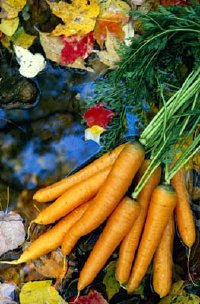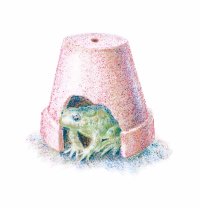What Is The Best Organic Calcium Supplement For Gardens
Organic gardening is popular today, and for good reason: It works wonderfully! Organic gardeners shun the use of synthetic chemicals to keep their yards free from potential hazards. But the real success of organic gardens lies in the methods used to keep plants growing vigorously, without a heavy reliance on sprays. Organic gardening cuts right to the heart of the matter: soil.
Soil is the life force of the garden. When enriched with organic matter, the soil becomes moist, fertile, and airy -- ideal for healthy plants. It also nourishes a rich population of beneficial organisms such as earthworms and nutrient-releasing bacteria. And it harbors root-extending fungi that help make growing conditions optimal.
Organic gardeners also stress problem prevention in the garden. Putting plants in the right amount of sun, along with suitable soil, proper spacing, and ideal planting and watering, allows most plants to thrive with minimal upsets.
The tips in this article will give you the basics on organic gardening. We'll start with how to make compost.
- Make compost the lazy way by layering leaves, lawn clippings, and kitchen waste. Then simply leave it until it's ready. Nature's recyclers will take organic matter no matter how it is presented and turn it into rich, dark compost. This process just takes longer in an untended pile.
To begin your compost heap, dump yard scraps in a far corner of the yard. An ideal blend would be equal amounts of soft or green material (manure and fresh leaves) and brown or hard material (dead leaves and chopped twigs). Or, if you prefer, keep the compost materials neatly contained in a wooden slat or wire mesh bin. If you put an access door on the bottom of the bin, you can scoop out the finished compost at the bottom while the rest is still decaying.
- Add compost starter or good garden soil to a new compost pile to help jump-start the decay of organic materials. Compost starter, available in garden centers or from mail-order garden catalogues, contains decay-causing microorganisms. Some brands also contain nutrients, enzymes, hormones, and other stimulants that help decomposers work as fast as possible. Special formulations can be particularly helpful for hard-to-compost, woody material like wood chips and sawdust or for quick decay of brown leaves.
Optional Compost-Making Equipment These items will come in handy when starting your own compost:
- Wire composting bin
- Stackable composting bin
- Wooden composting bin
- Vented plastic bins
- Worm boxes
- Compost tumbler
- Compost inoculant
- Garden fork
- Compost thermometer
- Sifting screen
- Good garden or woodland soil, although not as high-tech or as expensive as compost starter, contains native decomposers well able to tackle a compost pile. Sprinkle it among the yard scraps as you are building the pile.
- Use perforated PVC pipes to aerate compost piles. An ideal compost pile will reach three to four feet high, big enough to get warm from the heat of decay. Why is heat important? High temperatures -- when a pile is warm enough to steam on a cool morning -- semi-sterilize the developing compost, killing disease spores, hibernating pests, and weed seeds.But the problem is that in order for decomposers to work efficiently enough to create heat, they need plenty of air -- and not just at the surface of the pile. Aeration is traditionally provided by fluffing or turning the pile with a pitchfork, which can be hard work. But with a little advance planning and a perforated pipe, this can be avoided.
- Start a compost pile on a bed of branched sticks that will allow air to rise from below. Add a perforated pipe in the center, building layers of old leaves, grass clippings, and other garden leftovers around it. The air will flow through the pipe into the pile.
- Use on-site composting for easy soil improvement. Gather up old leaves, livestock manure, and/or green vegetable scraps and let them lie in or beside the garden until they rot, then work them into the soil. Or just heap them on the garden in the fall and till them into the soil. They will be decayed by spring. You can also dig a hole, dump in the yard waste, cover it with a little soil, and let it rot in privacy.
Check out the next section for suggestions on using organic fertilizer in your garden.
Want more gardening tips? Try:
- Gardening Tips: Learn great helpful hints for all of your gardening needs.
- Annuals: Plant these beauties in your garden.
- Perennials: Choose great plants that will return year after year.
- Gardening: Discover how to garden.
Organic Fertilizer
One universal tip when using fertilizer -- organic or otherwise -- is to read the package directions to ensure you use the proper amount. What follows are other helpful suggestions.

Organic fertilizer is a great way
to improve plant growth
in your garden.
- Expect to use more organic fertilizer, by volume, than synthetic chemical fertilizers. That's because organic fertilizers contain fewer nutrients by weight, averaging from 1 to about 6 or 7 percent. Contrast this with an inorganic lawn fertilizer that may contain up to 30 percent nitrogen, more than four times as much as organic fertilizer.
- More is not always better when it comes to fertilizers. Lower-dose organic fertilizers are unlikely to burn plant roots or cause nutrient overdoses. Many forms release their components slowly, providing a long-term nutrient supply instead of one intense nutrient blast. Organic fertilizers may also provide a spectrum of lesser nutrients, even enzymes and hormones that can benefit growth.
For details on how to use fertilizers properly, read the package labels. The volume of fertilizer required may vary depending on the kind of plant being fertilized and the time of year.
- Use fish emulsion fertilizer to encourage a burst of growth from new plantings, potted flowers and vegetables, or anything that is growing a little too sluggishly for your taste. High-nitrogen fish emulsion dissolves in water and is easily absorbed and put to immediate use by the plant. For best results, follow the package directions.
Find out more about ridding your garden of pests -- naturally -- in the next section.
Want more gardening tips? Try:
- Gardening Tips: Learn great helpful hints for all of your gardening needs.
- Annuals: Plant these beauties in your garden.
- Perennials: Choose great plants that will return year after year.
- Gardening: Discover how to garden.
Natural Pest Control
You don't always needs pesticides and other chemicals to eliminate pests from the garden. These tips offer alternative ideas that won't harm the environment.

A toad house is an excellent
natural pest repellent.
- Add toad houses to the garden to attract toads for natural pest control. Just as fairy-tale toads can be turned into handsome princes with just a kiss, ordinary toads become plant protectors just by hopping into the garden. They may not be pretty, but toads eat plenty of bugs, so you'll be glad to see them.
To encourage toads to come to live in your garden, try the following: 1) Put several broken clay pots in the garden for toads to hide under. 2) Water when the ground gets dry to keep the environment pleasant for amphibians. 3) Avoid spraying toxic chemicals on the garden. 4) Watch out for toads when tilling, hoeing, or shoveling.
Organic gardening can be great for you and for the environment. Follow the tips outlined here, and you'll be well on your way to a healthy garden.
Want more gardening tips? Try:
- Gardening Tips: Learn great helpful hints for all of your gardening needs.
- Annuals: Plant these beauties in your garden.
- Perennials: Choose great plants that will return year after year.
- Gardening: Discover how to garden.
What Is The Best Organic Calcium Supplement For Gardens
Source: https://home.howstuffworks.com/gardening/garden-design/organic-gardening-tips.htm
Posted by: hollandwoorkepark.blogspot.com

0 Response to "What Is The Best Organic Calcium Supplement For Gardens"
Post a Comment